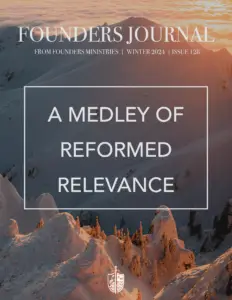This edition of the Founders Journal puts together articles on a broad spectrum of specific topics but all informed by the big ideas of the Reformed Confessional heritage.
Ottavio Palombaro, in addition to having gained a (Th.D.), also gained a Ph. D. in economic sociology along with a BA in cultural anthropology. His expertise includes a wide range of theological, sociological, philosophical, linguistic, and musicological subjects. His article in the Founders Journal focuses on John Knox and his biblical/theological/existential interaction with the question of female leadership broadly conceived. He describes the purpose of the article as an evaluation of “whether the view of John Knox on gender and leadership was Biblical and what lesson can be learned from the controversy between John Knox and queen Mary as applied to today’s shifts in gender and sexuality both in society and in the church.” As a fundamental principle of biblical presentation, Knox said, “So I say, that in her greatest perfection, woman was created to be subject to man.” That principle then is teased out through actual biblical phenomena as noted by Knox and elucidated by Palombaro. To those who may be deluged by post-modern standards having the shock of Knox come before them, concluding that he was a “horrid man,” the author noted that “they are using modern glasses in retrospection, neglecting the contextual historical as well as cultural realm into which Knox blew his apocalyptic trumpet.” None can doubt that Knox was a Calvinist, indeed a fully convinced Reformer with a biblical worldview, but, as Palombaro observes, that does not mean that he was a chauvinist. Rather that could mean that he had a more profound and excellent regard for femaleness than any of today’s so-called egalitarians. Judging from Knox’s grasp of biblical womanhood, Palombaro writes, “Just as women are to submit to their husband in the family, and just as men should be pastor in the church, so the issue of women in the military or transgender males playing female athletics are examples of how Knox had a point in his consideration upon human constitution.” This is a highly relevant and salubrious sip drawn from an aged and tested wineskin.
Chris Osterbrock earned the D. Ed. Min. in Biblical Spirituality from The Southern Baptist Theological Seminary. Presently he is a PhD Student in Historical Theology, Puritan Reformed Theological Seminary. He serves as senior pastor of First Baptist Church of Wellsboro, PA. and is author of What is Saving Faith? Chris presents us with a symphony and chorus of inexhaustible beauty in the “The Stingless Death,.” While this theme of Christ’s victory over death, even the wages of sin, is a universal Christian theme, the author focuses on the Baptist tradition of interpretation and practical application of 1 Corinthians 15:55. Keach, Gill, Wallin, Booth, Fuller, Ryland, Jr., Boyce, and several others have their say on this triumphant song. Osterbrock notes, “The individual authors may elucidate different sides of the gemstone, but Particular Baptist tradition holds together a cohesive interpretation. Herein we examine how this verse was understood in Baptist life through 200 years.” Among the facets of this scriptural gem, Baptist exposition has explained “the providence of God in death, a secured new life to come, a song to be sung in sanctification as well as glorification, and a song applied as a salve to extinguish sin in the present life.” It has given rise to celebrative imagery of intense poetic impulse such as the exclamation of Abraham Booth, “Thy haggard form I plainly discern; but where, where is thy sting? . . . for, behold! Thy sting is entirely and eternally gone. Jesus, the glorious victor, has plucked it from thee.” And finally, this ultimate enemy becomes the path to unblemished holiness. “Here in death,” the author deduces from the expositions investigated, “the Christian finds perfect mortification of sin and depravity, and in death there is the perfect sanctification of the body and soul for glory.”
Craig Biehl earned his Th.M. from Dallas Theological Seminary and a Ph.D. in Systematic Theology from Westminster Theological Seminary. His books deal with the power of Reformed theology in promoting Christian spirituality, the power of orthodox thought, and the futile systems promoted by unbelief. In his article, “Are God’s Justice and Mercy Incompatible?” Craig Biehl unfolds the consistency of biblical orthodoxy to engage serious philosophical objections to the Christian doctrine of God. Letting Theodore M. Drange speak for one specific argument against the existence of God, he sets forth this supposedly inescapable moral dilemma. A god who is just—and a god must be just—would “treat every offender with exactly the severity deserved.” But a god must show the tenderness of mercy and so would treat “every offender with less severity” than deserved. Since these necessary attributes for a god contradict, a god cannot exist. Mercy perverts justice, and justice militates against mercy. Biehl brings to this unbreakable dilemma the biblical teachings on the person of Christ and the nature of the atoning work of Christ. “As a man, Christ was the perfect substitute for mankind. As God and man, He was the perfect mediator between God and man. And as God, His suffering and death paid an infinite penalty for the sin of mankind. This He did once for all time, never to be repeated.” The substitutionary, propitiatory atonement made by Christ in covenant obedience to the Father fully satisfies the demands of both justice and mercy. God is “just and the justifier of the one who has faith in Christ” (Romans 3:26 NASB). Does this violate either absolute justice or the extension of mercy to the violator of God’s law? Biehl shows that “In this way, salvation by faith upholds God’s righteous justice. ‘Do we then nullify the Law through faith? May it never be! On the contrary, we establish the Law’ (Rom 3:31).” In this justice-is-contrary-to-mercy objection to the God of the Bible we have “an example of what besets the best of atheistic arguments.” As Creator, Sustainer, and Judge—and whose image actually establishes all the rules of logic, justice, compassion—God solves this apparent moral contradiction “according to His wisdom.” But, as Biehl points out, even this infinitely powerful, logically consistent, and surpassingly wise solution appears to rebellious man as foolishness. But to those who believe, it is the power of God and the wisdom of God.
Robert Gonzalez, Academic Dean and a professor of Reformed Baptist Seminary since 2005, in “The Saving Design of God’s Common Grace” gives an exposition of this fundamental biblical proposition: though common grace “does not guarantee the salvation of its recipients,” it is nevertheless “saving in its design.” In accord with Romans 2, “God sincerely intends the kindness and patience he shows to all sinners (whether elect or non-elect) to lead them unto saving repentance.” After arguing this case with careful exegesis and in interaction with the hyper-Calvinist wing of theologians, Gonzalez concludes “from the evidence above we may conclude a saving design in the indiscriminate common grace God showers on all men whether elect or non-elect.”
This is of the nature of a Gospel Worthy of All Acceptation theological idea. Although it is perfectly just and holy for God to allow humanity to choose its own course of action on the basis of its preferences, God’s calls to believe the gospel or repent heartily from sin are in their nature calls for restoration to a non-cursed relationship with God. He calls neither to hypocritical faith nor merely feigned repentance. He is under no moral impetus, however, to provide effectual grace by which saving faith and repentance are truly manifested. He may justly leave all men or as many as he deems it fitting and consistent with his wise decrees to continue in their course of purposeful rejection of both his moral commands or his overtures of engagement for restoration. Both the call of the gospel and the call of creation and other manifestations of common grace have as their absolute moral end a cessation of rebellion against God and an inclusion as a true worshipper of Jehovah.
Each of these articles looks seriously at the Reformed confessional stance and shows its powerful relevance to any moral, cultural, or religious issue.





















